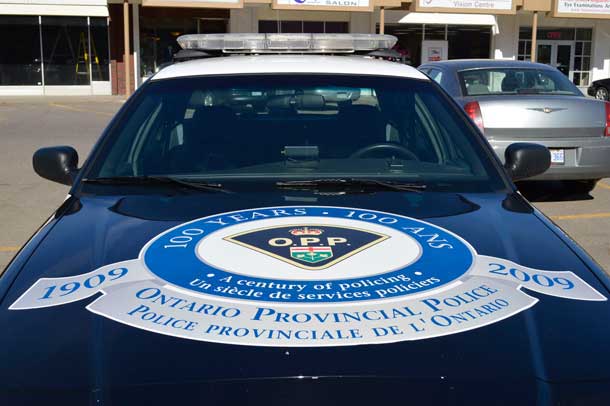
Keep the Police out of your Rear View Mirror
THUNDER BAY – Heading into the holiday long weekend. The RCMP and the OPP are sharing messages of the importance of safe driving. For the Ontario Provincial Police (OPP), they are giving the public a heads-up on what dangerous driving habits they’ll be watching out for, and what positive driving behaviours they will be expecting from motorists throughout the province.
One important law the OPP will be looking for drivers to adhere to is Ontario’s Move Over law. This law applies to all motorists who are approaching a police, fire or ambulance vehicle in the same direction of travel, stopped on the roadside with its lights flashing. Drivers in this situation are required to slow down and pass with caution, but if the road has multiple lanes, drivers must move over into another lane, if it can be done safely.
According to Deputy Commissioner Larry Beechey, Provincial Commander, Traffic Safety and Operational Support, far too many drivers ignore this law. “Since 1989, we have lost 5 OPP officers who were tending to their duties on the side of the road when they were killed by approaching vehicles and many of our emergency partners have also died at the hands of careless drivers in the same situation,” said Beechey.
Move Over Law Saves Ontario Provincial Police Officer’s Lives
The OPP is reminding motorists that because this law was introduced 10 years ago (in 2003), the grace period during which officers tend to raise awareness of a new law and let people off with a warning is no longer in effect and violating this law comes with a $400 to $1200 fine and 3 demerit points upon conviction.
“Over the 2012 Civic Holiday Long Weekend, we lost 5 people in motor vehicle collisions within OPP jurisdiction and this year our officers will be on alert for people who display aggressive driving habits, those who drive while impaired or distracted and those who are not wearing seat belts,” said Chief Superintendent Don Bell, Commander of the OPP Highway Safety Division.
Royal Canadian Mounted Police Seek to Reduce Impaired Driving

For the RCMP in K Division, the focus for the month of August is once again on impaired driving. While impaired driving is usually associated to the operator having consumed a mind-altering substance such as alcohol or drugs; can one be impaired by lack of sleep?
How many yawns are too many? Part of a recent campaign from the Coalition for a Safer 63 and 881, this is a question that every driver should ask themselves before getting behind the wheel.
The responsible driver would never attempt to drive after too many drinks, but have you ever thought about the inherent dangers associated to driving while tired?
Driving Tired is Impaired Driving Too
“Driving tired is driving impaired as fatigue affects our ability to safely and effectively operate the vehicle due to slowed reaction time and decreased awareness.” stated Wood Buffalo RCMP Traffic Services Commander Sgt. Al Boulianne.
As noted by the Canadian Council of Motor Transport Administrators Research, driver fatigue is estimated to be a contributing factor in 20 percent of all fatal collisions.
Telltale signs that you may be too tired to drive include loss of concentration, drowsiness, yawning, slow reactions, sore or tired eyes, boredom, feeling irritable and restless, missing road signs, difficulty staying in the proper lane, and nodding off.
Drivers experiencing these symptoms are encouraged to seek a safe area to pull over and rest.
Protect yourself and others while travelling with the following tips:
- Drive only during your normal waking hours.
- Stay well hydrated and travel with extra bottles of water
- Avoid medications that cause drowsiness, even over the counter. This includes cold and allergy medications.
- Avoid the consumption of any alcohol as it compounds fatigue issues.
- Roll down your window to allow fresh air into your vehicle
- Pull over and take a stretch break every 2 hours or when you feel yourself starting to fade.
Although impaired driving due to fatigue does not fall into the same chargeable offence category as impairment due to drug or alcohol, drivers can still be charged under a variety of acts, both federally and provincially, for driving tired and face substantial penalties upon conviction.













